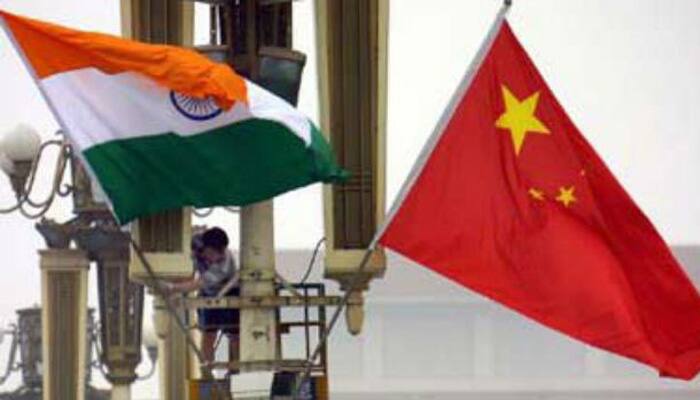Delhi: External Affairs Ministry said on Thursday that it was seeking 'peaceful resolution' of all boundary matters with China, including military standoff at Doklam in the Sikkim sector.
Addressing the press, spokesperson Gopal Baglay referred to India`s June 30 statement to reiterate that "basically India`s approach has been to find peaceful resolution of all matters concerning the border with China."
He also said that India`s National Security Advisor (NSA) Ajit Doval will be visiting Beijing on July 27 and 28 to attend a BRICS meeting but parried questions whether there will be any bilateral meetings with his Chinese counterpart Yang Jiechi on the sidelines of the meeting of the five-nation grouping.
The meeting of NSAs of BRICS nations will be hosted by Yang.
However, Baglay refused to share the details on what kind of diplomatic channels the two countries were using to ease the border tension at Doklam.
"I would not like to go into the details of how and between whom and when such conversations have taken place, if they have taken place," he said.
The spokesperson said the government of India has been laying stress on the Astana consensus between Prime Minister Narendra Modi and Chinese President Xi Jinping arrived at last month that the two countries must not allow differences to become disputes.
"Every responsible power, every responsible person and player in the world, of course, prefers peaceful resolution of matters that are in hand," he said, as per IANS.
China aiming at unilaterally changing tri-junction status: Sushma Swaraj
Meanwhile, External Affairs Minister Sushma Swaraj said today that China intends to unilaterally change the status of the tri-junction with Bhutan, which poses a challenge to India's security.
Responding to supplementaries during Question Hour, she informed the Rajya Sabha that there was a written agreement between India, China and Bhutan in 2012 that the three nations will together decide on the boundaries at the tri-junction point.
The Minister said the boundaries between India and China are yet to be finalised and the two nations will do that bilaterally through discussions, while the same between China and Bhutan too will be done through bilateral talks.
She also accused China of building roads using bulldozers and excavators, which has been protested by Bhutan in writing to China.
The Minister also said that India was not 'unreasonable' on the issue and all nations were with it.
"India's position is not wrong on the tri-junction and all nations are with it. The law is with our country," she said.
Swaraj said all countries are supporting us and they understand that the stand taken by India on the issue is not wrong.
She said the matter can be resolved through talks and "We are willing to talk, but both sides have to first take back their armies."
What India had said on June 30:
India on June 30 had hit back at China for making veiled threats with Defence Minister Arun Jaitely asserting that India of 2017 is different from what it was in 1962.
After China's oblique reference to the war the two countries had fought 55 years ago, Jaitley had said that the current standoff between Indian and Chinese troops was triggered by Beijing.
The MEA had said then that it was essential that all parties concerned display utmost restraint and abide by their respective bilateral understandings not to change the status quo unilaterally.
"India is deeply concerned at the recent Chinese actions and has conveyed to the Chinese government that such construction would represent a significant change of status quo with serious security implications for India," the MEA had asserted in a press release at that time.
"In coordination with the Royal Government of Bhutan, Indian personnel, who were present at general area Doka La, approached the Chinese construction party and urged them to desist from changing the status quo. These efforts continue," the ministry had added.
"It is our understanding that a Royal Bhutan Army patrol attempted to dissuade them (the PLA construction party) from this unilateral activity," the MEA had maintained.
Diplomatic channels 'unimpeded' to resolve standoff: China
On the other hand, China said today that diplomatic channels with India remained 'unimpeded' to discuss the military standoff in Sikkim sector but reiterated that the withdrawal of the Indian troops from Doklam area is a 'precondition' for any meaningful dialogue.
"Our diplomatic channel is unimpeded," Foreign Ministry spokesman Lu Kang told reporters.
Lu, however, reiterated that "the withdrawal of the Indian border personnel is the precondition for any meaningful dialogue and communication between the two countries".
Lu claimed that the incident makes it clear that "Indian border personnel illegally trespassed into China's territory," as per PTI.
Why the stand-off at Indo-China border:
Chinese and Indian soldiers have been locked in a face- off for over a month after Indian troops stopped the Chinese army from constructing a road near the Doklam plateau, fearing it may allow China to cut India's access to its northeastern states.
India has conveyed to China that the construction of the road would represent a significant change of status quo with serious security implications for New Delhi.
While status of Sikkim as part of India has been settled with China, the border is yet to be finalised.
India and China share a 220-km-long border in Sikkim.
(With Agency inputs)
















